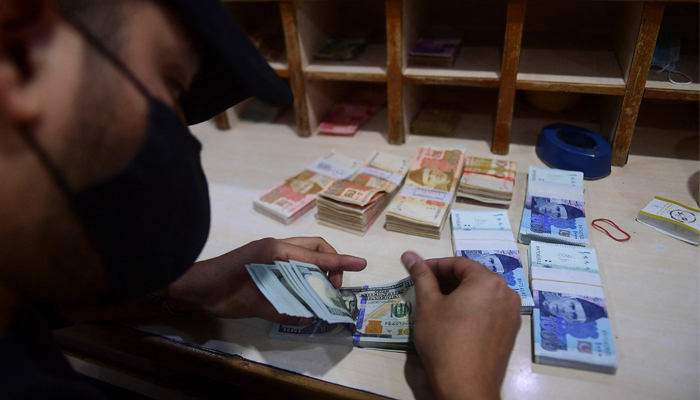Smuggling of US dollars to Afghanistan harming Pakistan’s economy: currency dealer
December 27, 2022

- About $2bn goes to Afghanistan in form of official, unofficial trade.
- Both Afghan, Pakistani traders are involved in this activity.
- Afghan transit trade, smuggling burdening Pakistan’s forex reserves.
KARACHI: The Pakistani currency is under pressure owing to the ongoing political unrest in the country and the smuggling of US dollars to Afghanistan, The News reported Tuesday citing foreign exchange dealers.
“Pakistan is currently dealing with problems on several fronts, the political crisis being the first and biggest one. The dollar crisis is also connected with it,” said Malik Bostan, the chairman of the Exchange Companies Association of Pakistan (ECAP) at a news conference.
About $2 billion goes to Afghanistan from Pakistan in the form of official and unofficial trade, misuse of Afghan transit trade, smuggling and through the borders, said Bostan, adding that these factors are burdening Pakistan’s foreign exchange reserves.
Currently, Pakistan’s economy is suffering irreparable harm because of the Afghan transit trade, which has grown significantly. A significant portion of the dollars travelling from Pakistan to Afghanistan passes through the Afghan transit trade, and both Afghan and Pakistani traders are involved in this anti-national activity, he added.
To lower the import bill, the government imposed high duties on many luxury goods.
“Our traders and importers thought that why should they pay a 200% duty to the Pakistani government,” Bostan said, and added they operate a global network, accepting payments through hundi/hawala in Dubai, London, Europe, America, Saudi Arabia, and everywhere else.
They bring their items here in the name of Afghan transit, travelling from our port to Afghanistan and then returning to Pakistan in small trucks. Numerous importers from Pakistan who participate in this atrocious practice not only fail to pay import duties, which costs the national exchequer billions of rupees, but also prevent dollars from entering the country, he said.
When the Afghan Taliban established a transition government in August 2021, the Pakistani rupee was trading at 155, the country’s foreign exchange reserves were $22 billion, and its import bill was $4.5 billion. According to Bostan, today the rupee has fallen to almost 225 in the interbank market and 235 per dollar in the free market.
He claimed that every month, about $3 billion in remittances were sent to Pakistan. The remittance flows have now decreased to $2 billion. “Where does this monthly $1 billion go? Because we are paying remittances at 225 rupees for every dollar, this $1 billion per month has become the sight of Afghan transit. The hawala/hundi operators are giving those 270 for every dollar,” said the chairman.
Bostan said there are just three major international companies with which the exchange companies have signed money transfer agreements at the present. “We have requested that SBP let exchange companies negotiate partnerships with at least 50 significant global money transfer firms,” Bostan said.
“Exchange companies receive roughly $2 billion in worker remittances each year, and in terms of exporting foreign currency, these companies provided about $3 billion to Pakistani banks last year. The exchange companies are significantly contributing to the stabilisation of Pakistan’s reserve, the Pakistani rupee, and the Pakistani economy by relinquishing it in the interbank market,” he said.
“If the government gives us an agreement with 50 international money transfers companies, the exchange companies can bring $7 to $8 billion to Pakistan annually.”











